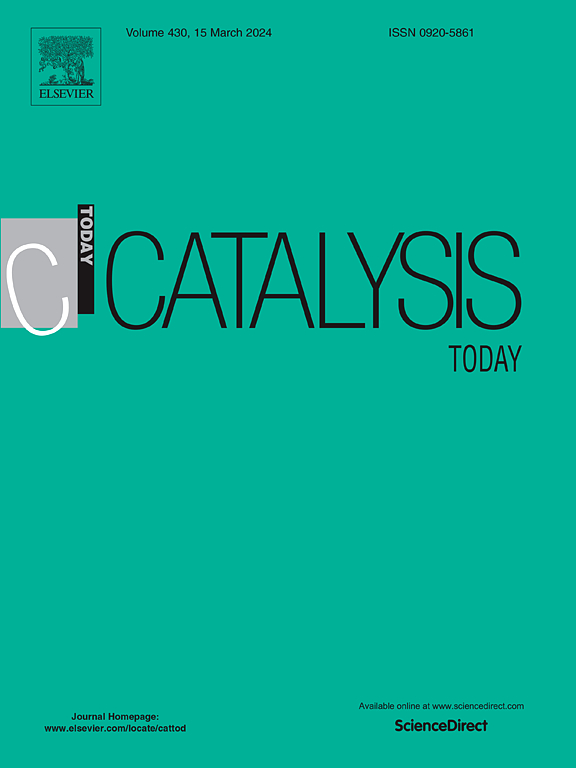Enhanced production of BTX from PET-LDPE co-pyrolysis via Ga- and Zn-impregnated HZSM-5 catalysts
IF 5.3
2区 化学
Q1 CHEMISTRY, APPLIED
引用次数: 0
Abstract
The coexistence of polyethylene terephthalate (PET) and polyolefins in plastic waste poses a significant challenge for pyrolysis-based recycling, as PET decomposition generates oxygenates that reduce product quality. To address this, we developed a two-stage reactor system that catalytically upgrades vapors from PET–LDPE mixtures using Ga- and Zn-impregnated HZSM-5 catalysts. XPS analysis revealed that impregnation with Ga and Zn leads to the formation of GaOx and ZnOH+ species, which introduce new Lewis acid sites. When these sites are located near Brønsted acid sites, synergistic interactions enhance both deoxygenation and aromatization, improving the catalytic performance of HZSM-5. At 600 °C, PET pyrolysis produces significant amounts of CO2, CO, and benzoic acid, resulting in oxygen-rich pyrolysis oil. While unmodified HZSM-5 achieves full deoxygenation, the resulting PyOil yield is modest, ranging from 24 to 34 wt%. In contrast, Ga- and Zn-modified catalysts increase PyOil yield to ∼50 wt% and improve mono-aromatic (BTX) selectivity to 80–89 % by shifting the acid site distribution toward weaker acidity, thereby favoring decarboxylation, decarbonylation, and aromatization. Notably, Zn-HZSM-5 maintained high BTX selectivity even with increasing PET content, outperforming Ga-HZSM-5, which exhibited higher polyaromatic hydrocarbon formation under similar conditions. These results demonstrate the potential of Ga- and Zn-modified HZSM-5 catalysts for the efficient conversion of mixed plastic waste into BTX-rich oils suitable for fuel and chemical applications.
通过浸渍Ga和zn的HZSM-5催化剂提高PET-LDPE共热解生成BTX的效率
塑料垃圾中聚对苯二甲酸乙二醇酯(PET)和聚烯烃的共存对基于热解的回收提出了重大挑战,因为PET分解产生的氧化物会降低产品质量。为了解决这个问题,我们开发了一种两级反应器系统,使用Ga和zn浸渍的HZSM-5催化剂催化升级PET-LDPE混合物的蒸汽。XPS分析表明,Ga和Zn的浸渍导致了GaOx和ZnOH+的生成,并引入了新的Lewis酸位点。当这些位点位于Brønsted酸位点附近时,协同作用增强了脱氧和芳构化,提高了HZSM-5的催化性能。在600℃时,PET热解产生大量的CO2、CO和苯甲酸,生成富氧热解油。而未经改性的HZSM-5实现完全脱氧,得到的PyOil产率适中,在24 - 34 wt%之间。相比之下,Ga和zn修饰的催化剂将PyOil收率提高到~ 50 wt%,并将单芳香(BTX)选择性提高到80-89 %,这是通过将酸位分布向弱酸性转移,从而有利于脱羧、脱碳和芳构化。值得注意的是,即使PET含量增加,Zn-HZSM-5也保持了较高的BTX选择性,优于在相同条件下具有较高多芳烃生成率的Ga-HZSM-5。这些结果证明了Ga和zn改性的HZSM-5催化剂在将混合塑料废物高效转化为适合燃料和化学应用的富含btx的油方面的潜力。
本文章由计算机程序翻译,如有差异,请以英文原文为准。
求助全文
约1分钟内获得全文
求助全文
来源期刊

Catalysis Today
化学-工程:化工
CiteScore
11.50
自引率
3.80%
发文量
573
审稿时长
2.9 months
期刊介绍:
Catalysis Today focuses on the rapid publication of original invited papers devoted to currently important topics in catalysis and related subjects. The journal only publishes special issues (Proposing a Catalysis Today Special Issue), each of which is supervised by Guest Editors who recruit individual papers and oversee the peer review process. Catalysis Today offers researchers in the field of catalysis in-depth overviews of topical issues.
Both fundamental and applied aspects of catalysis are covered. Subjects such as catalysis of immobilized organometallic and biocatalytic systems are welcome. Subjects related to catalysis such as experimental techniques, adsorption, process technology, synthesis, in situ characterization, computational, theoretical modeling, imaging and others are included if there is a clear relationship to catalysis.
 求助内容:
求助内容: 应助结果提醒方式:
应助结果提醒方式:


